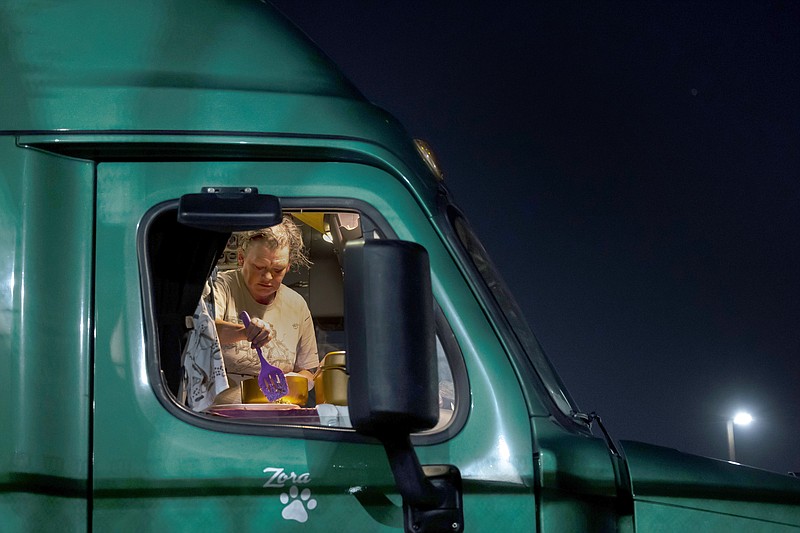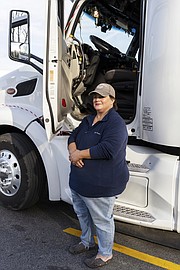MADISON, Conn. - Dina McKinney's kitchen looks like something straight out of a home-goods catalog. The spices are neatly organized in glass jars. The countertop is made of a thick walnut Boos block. The backsplash is white-tiled and shiny. The dish towels are seasonally appropriate, adorned with Santas this time of year.
Checking out all the details, you might forget that McKinney lives in a 14,000-pound semi truck. Her kitchen, crammed into a space behind the front seats of her cab, is all of 7 feet long; her combination microwave oven and air fryer is just an arm's length from the steering wheel.
On a recent night, she was parked at a service plaza off Interstate 95 near the Connecticut coast, plunging an immersion blender into a slow cooker filled with butternut squash soup that she had seasoned with a curry brick, celery and onions and let simmer all day while she drove.
"I want to feel human," said McKinney, 56, who lives full time in the truck. "I don't want to feel deprived of simple pleasures in life."
That resolve extends to the holidays. McKinney, who drives all over the country, primarily transporting kitchen cabinetry, was in her truck Christmas Day and had big plans for the occasion. A wheel of brie in her minifridge was wrapped in puff pastry and baked as a holiday appetizer. She roasted a rosemary-and-thyme-rubbed turkey leg on her rotisserie, using the drippings to season a turkey breast. Brussels sprouts were sautéed with bacon on her butane stove. She made sweet potato soufflés in a muffin tin.
Not every truck driver has McKinney's elaborate setup. But a number of them are cooking more often in their trucks - out of necessity, a desire for healthier food or both.
There are more than 3 million truckers in the United States, and for many of them, the holiday season is typically a hard time. Adding to the pressure this year is a nationwide shortage of drivers and supply-chain bottlenecks that have taxed the patience of shippers and consumers. Many of the truck stops that truckers rely on for eating, resupplying and resting have closed because of the COVID pandemic.
"There is a supply-chain issue, and on top of that, the holiday season," said Raman Dhillon, CEO of the North American Punjabi Trucking Association. "It is like a double whammy on both sides."
The crunch is compounded, he added, by working conditions that have long been part of the job: punishing hours, low pay and, for the women who have increasingly joined the ranks, rampant harassment.
In interviews, many long-haul truckers said they were working through the holidays to make extra money and meet the demands of the moment. But they meant to find ways to celebrate, within the limits of their tight spaces and schedules. Their plans included decorations, music and festive meals of roast meats, casseroles and charcuterie boards - most of it prepared, ingeniously, in the confines of the truck.
Margie Gilles, a trucker from Wisconsin Rapids, Wisconsin, used to eat half of her meals at truck stops. She quickly grew tired of fast food, and dining options dwindled even more during the pandemic. She said her cooking skills have vastly improved over the last two years.
This Thanksgiving, Gilles, 55, made a stuffed roast duck, roasted yams, green bean casserole, cheesy garlic mashed potatoes and cranberry sauce - all using the portable induction cooktop stashed behind the driver's seat and an air fryer that sits on a shelf where the passenger seat used to be. (She went easy on herself for dessert and bought a cherry cheesecake.)
For Christmas, she made a leg of lamb and an eggplant casserole. She parked at a rest stop and played holiday songs on her violin with the windows down so other truckers could listen. She planned to share her food with anyone who was around.
Making the meal isn't too difficult, she said. But doing the dishes is a challenge. "I wipe mine off as best as I can and then take them into a truck stop and wash my dishes while I take my shower," she said.
What she'd miss most was baking cookies with her family. "I would not even consider doing that on my truck," she said. "Flour going all over, plus the beaters. No." She gets home once a month and is able to visit her family in Deerfield Beach, Florida, once or twice a year.
Gilles predicted that as the pandemic continues, in-truck cooking will become even more prevalent. On the internet, this practice has become a subculture, with dedicated Facebook groups, blogs and TikTok accounts.
McKinney compared its appeal to that of Van Life, a cultural movement that glamorizes living in a small space.
But while Van Life is often about affluent people deciding to become nomads and document their experiences on social media, McKinney said truck life is more about being resourceful out of necessity. She became a truck driver four years ago because she felt it was one of the few professions available to her as a woman older than 50 without a college degree.
Tamra Fakhoorian, 63, recognizes that ringing in the New Year on a truck will never be the same as celebrating back home in western Kentucky with her nine grown children. "My family knows Mom is on the road," said Fakhoorian, who has been driving in the United States and Canada for three years, "so you kind of learn to toughen up a little bit."
But she wants New Year's Eve to feel special, so she'll make a big charcuterie board with cured meats, cheeses and olives. She'll hang lights around her bed and record herself talking about her goals for the next year - countries to visit, home-improvement projects to undertake.
Fakhoorian is ambitious with her in-truck cooking year-round, making spring rolls, stuffed peppers and tandoori chicken. Grocery shopping can be difficult for truckers because of parking, so she grows some of her own food. She sprouts mung beans in a drawer directly behind her driver's seat, and used to hang a pot in the passenger window filled with basil, mint and chives. It was confiscated when she was going through customs on a drive back from Canada.
Depression runs high among truckers during the holidays, said James Wills, a driver from outside Tacoma, Washington. "You see all your Facebook friends, and they are posting all these beautifully laid out dinners and pictures of all their family gathered around. You are sitting in your truck by yourself."
Cooking Christmas dinner helped to alleviate that sadness, he said. This year, he treated himself to a steak cooked on his George Foreman grill, paired with instant mashed potatoes and gravy. When he cooks on the grill, he sets up outside if the weather is nice, otherwise on a tray between the driver and passenger seats.
Wills, 50, started cooking more in his truck about five years ago, after he had a heart attack and decided to eat more nutritiously. Prep space is limited in the truck, so he cuts up his vegetables and meats at home and stores them in the freezer - perched on a raised bunk behind the front seats - until he's ready to cook.
McKinney, the driver who stopped to cook in Connecticut, is considering starting a YouTube channel to teach people how to cook in trucks and show that trucking can be a great way to live.
"There are so many things we can't control," she said, "and so for us to put ourselves in harm's way on a daily basis multiple times a day, there just has to be a place where I can go where I can have some peace and quiet."
And what better oasis, she said, than a well-stocked, well-organized kitchen?

